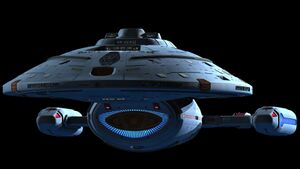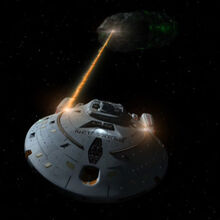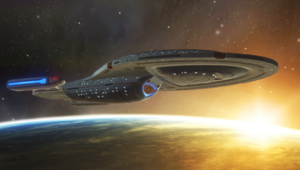Intrepid Class
More actions
The Intrepid-class science vessel is a fast and highly-capable independent research and exploration platform. First developed as a less crew-intensive complement to the Galaxy-class explorer, this class was the culmination of several experimental technologies for Starfleet in its efforts to launch a new generation of exploration type vessels in the late 2360s. As a testbed, the Intrepid was a decade in the making to offer the exploration and scientific capabilities of the Galaxy without the massive space frame or resources required to operate the much larger Galaxy. The seven-year journey of the USS Voyager to return home from the Delta Quadrant only validated the versatility and endurance of the Intrepid, making it a mainstay of Starfleet’s exploration arm. By the beginning of the 25th century, it remains useful but is beginning to show its age in comparison to the likes of the Luna and Vesta.
Exploration and Science
The Intrepid is solidly capable of long-term exploration missions without significant support, a capability proven by Voyager's seven-year mission in uncharted Delta Quadrant. In terms of pure science, she can handle anything ranging from logging gaseous anomalies to planetary analysis to scanning sub-quantum mass particulates. As an explorer, vessels of this class have been responsible for many first contacts.
The Intrepid, at the time of its launch, had sensors on par with the equipment found aboard Galaxy-class explorers and Nebula-class heavy cruisers, limited only by the smaller number of actual pallets it could mount. One advantage this class has over its elder sisters is a large forward sensor platform located on the forward dorsal of the primary hull, which is attuned to pathfinding operations. By the 25th century, regular updates to the Intrepid's cutting-edge sensors have ensured that she keeps pace with newer explorer classes, though newer science vessels, such as the Pathfinder (itself based on the Intrepid spaceframe) and the Sutherland, now boast more sophisticated and specialized equipment. All Intrepid-class ships are now equipped with an astrometrics lab based on the innovations created by Seven of Nine for Voyager, and Borg-inspired sensor enhancements have been implemented across the class.
By definition, a science vessel such as the Intrepid has its capabilities limited compared to true explorers because of its limited available space. This was intentional, though, as it allows the Intrepid to perform similar missions to the Galaxy, Sovereign, and Odyssey with a much smaller footprint. In practical terms, this means fewer labs, smaller fuel reserves, and fewer redundancies in staff; while a Galaxy captain could expect her crew to be able to staff four shifts in every lab, that is not so of an Intrepid captain. Because of size constraints, an Intrepid has fewer specialized labs compared to a large explorer, but they are very well equipped to be configured as needed; for example the botany lab has the equipment to handle agricultural science, microbotany, paleobotany, and astrobotany studies.
When designed, it was envisioned that the Intrepid may be able to complete three or four-year missions, as the ADSB believed that the increases in efficiency created by her advanced systems would be outweighed by her extensive maintenance demands and small fuel reserves. Voyager's ability to survive without Starfleet support for seven years proved this belief to be incorrect and lessons learned from this journey have streamlined Intrepid maintenance schemes and vessels of this class have engaged in five, six, and seven-year missions in deep space. Starfleet now prefers to limit this class to three-year missions, as those vessels that have been sent on longer journeys tend to arrive back in spacedock needing extensive work to put them back into service.
As with the Nova-class surveyor designed contemporaneously, the Intrepid has the ability to land and take off from a planetary surface, this generation of Starfleet vessel being the first classes to do so as part of routine rather than emergency operations. The Intrepid-class hull design allows for a smooth atmospheric entry and egress, while landing gear on the bottom of the vessel supports the starship firmly on the surface of a planet, allowing for all ships systems to be taken offline if necessary. Landing mode was a two-fold problem solver for Starfleet. It allows for both extensive repairs in the field that would otherwise require a spacedock (to increase her exploratory range), and also allows for easier transfer of equipment and personnel for any extensive planetary surveys.
Finally, the Intrepid is equipped with an embarked runabout docked directly to the primary hull, the Aeroshuttle. This craft is based on the Danube-class design, though with an integrated hull design that provides lift in planetary atmospheres. It is designed for conducting scientific surveys and other away missions.
Diplomacy
As with all explorers, Intrepid-class starships are designed to be able to perform first contact missions. Her relatively small size led her designers to prioritize this type of mission over hosting large conferences or multi-party talks. Her guest quarters are small but well-appointed, and captains have several onboard briefing rooms and lounges to choose from for welcoming guests. Intrepid-class captains must be well versed in the art of diplomacy, as the size of their vessels generally does not allow for a huge diplomatic support staff to be embarked.
Because of their high speed, Intrepid-class starships have been popular as couriers for flag officers and diplomats, most notably the USS Bellerophon's use by Admiral William Ross to travel to Romulus during the Dominion War. This assignment is rare, because these ships are better used on the frontier, and newer vessels like the Manticore can perform the task more quickly and with more security.
Engineering
Upon its launch, the Intrepid was the testbed for experimental, cutting-edge technology that later became standard issue on all ships ahead of it. The most significant of these advances were the class-9 warp drive, variable-geometry warp nacelles, integrated bio-neural circuitry, and the Emergency Medical Hologram system. Maintenance advances have improved efficiency over the years, but these finely-tuned systems remain a major challenge for any engineering team. Indeed, the class retains a very similar configuration to the original design because of how closely all of its systems are integrated, limiting the possibilities for radical overhauls.
The Intrepid was the first design to implement the new class-9 warp drive which allowed it to top speeds of warp 9.975, which made it the fastest Starfleet vessel at the time of its launch. Additionally, it was the first Starfleet vessel to field variable-geometry warp nacelles. The nacelles, when at warp velocities, pivot up at an angle. These two things combined made it the most subspace-friendly vessel that Starfleet had fielded to date with concerns of subspace damage due to extensive warp use spreading across the Alpha Quadrant. It also allowed the Intrepid to sustain much higher warp speeds for much longer periods of time than any vessel before it. With three decades of service history logged on these engines, they are now extremely reliable and some daring engineers have managed to coax a few more points of speed out of them. This design went on to be used in the Odyssey and Rhode Island classes as well, and led to the class-10 in the Vesta.

One of the most important innovations developed for the Intrepid was its integrated bio-neural circuitry. As a supplement to the traditional isolinear circuitry, the bio-neural gel packs act as a nervous system throughout the Intrepid. The bio-neural gel packs allows the Intrepid-class computer core and systems to process information more efficiently, using more instinctive data processing, speed up probability calculations, and cutting down on the amount of crew needed to maintain its systems. The Intrepid also proved as a steep learning curve for the bio-neural systems. While far more robust and durable than traditional circuitry systems, and therefore requiring far less maintenance, they proved to require just as much previously unforeseen medical monitoring as they do engineering monitoring. This system has now been implemented widely across Starfleet, and maintenance protocols have made it much less susceptible to the biological threats encountered by Voyager, but such failures remain a possibility.
Finally, as a supplement to the ship’s medical facilities, the Intrepid was one of the first to also field the Emergency Medical Hologram. Utilizing the holographic emitters in the Intrepid’s sickbay, the program was meant to supplement medical staff in the case of an emergency, allowing a holographic doctor to help diagnose, triage, and treat patients. In the case of at least one starship, it was able to completely replace the ship's entire medical staff with several expansions to its program. Overall, the technology proved to be incredibly useful to Starfleet vessels, particularly those Intrepid-class starships on the frontier, and has been supplemented, enhanced, and improved across multiple Starfleet classes since the first implementation on the Intrepid. Ships of this class now have ship-wide holographic projectors, and many now carry additional emergency or long-term holograms, but not at the fidelity of more modern ships.
Tactical

Initially classified officially as a “light cruiser”, the Intrepid boasts a comprehensive but modest array of weaponry in its arsenal. Though easily out-classed by medium-sized threat vessels like the Valdore or Vor'cha, the Intrepid has impressive phaser array coverage with very few blind spots. Her 13 phaser arrays are originally shared from the original Type-X system designed for the Galaxy class. Her overall firepower is substantially more limited than the Galaxy because of her much smaller power generation capabilities, putting out only a fraction of the firepower the Galaxy can while at peak operating power. Design studies were conducted to upgrade the arrays to Type-XII standards in parallel with the Rhode Island-class scout, but the ADSB could not solve power generation shortfalls such an upgrade would create without completely redesigning the warp engine systems as well, and it was deemed non-essential for an exploratory vessel. The Intrepid also sports two forward and two aft torpedo launchers, all of which are capable of firing both photon and quantum torpedoes as needed. The launchers can also be configured to fire probes and tricobalt devices if mission priorities require it.
Ships of this class are generally not assigned to purely tactical missions, but their defensive capabilities make them well-suited to operating independently in moderately dangerous areas. Indeed, production of this class was limited during the Dominion War because of the comparative waste of resources it would be to use them en masse in battle situations. An Intrepid can out-run nearly any threat, and this is usually the preferred alternative to conflict. With large numbers of similarly-sized Prometheus and Manticore-class heavy escorts now in service, along with the large fleet of Inquiry-class heavy cruisers, Starfleet is able to keep the Intrepid assigned to the role it is best at: exploration.
Shipboard Life

While smaller than the Galaxy, the Intrepid was built to a similar standard of crew comfort, as her crew is also proportionally smaller. The Intrepid does not employ residential hallways, and crewmen at the most are two to a room and two rooms to a shared living area and head. Lieutenants and above have their own quarters, and the ship's senior officers have quarters with very large viewports. The ship's captain has an impressive suite on deck 3. Even in the 25th century, these accomodations are considered quite comfortable, and they have kept up with improvements in holography that allow for on-the-fly furniture and decor reconfigurations. The Intrepid is more limited in terms of the number and type of recreational facilities available, though, which means that the whole crew tend to see each other in places like the mess hall on deck 2 and the more intimate lounge on the stern.
Relying more on holodecks than larger ships, the Intrepid was launched with the most advanced standard of holodeck available. Over the years, some vessels of this class have been equipped with additional holosuites to help meet crew demand, but this is always a balance between crew comfort and mission capabilities. Medical facilities are compact but state-of-the-art; many ships of this class have had their sickbays increased in size substantially, thanks to lessons learned from Voyager. Improvements in holography also allow for spaces within sickbay to be reconfigured for specialized procedures.
Ships of these class almost always have fewer than 200 crew members aboard, and their extended mission profiles mean that crew members will get to know each other very well during their time together. It's not quite so close quarters that folks don't have any privacy at all, but a small ship means that scuttlebutt will quickly uncover any secrets or drama. This remains a sought-after assignment for nearly any career path, and Intrepid-class captains continue to be among Starfleet's best and brightest.
Intrepid Class History
The Intrepid-class was an astonishing feat of technological innovation that began its development in the midst of the launch of the Galaxy-class platform. As Starfleet pined for larger, more multi-mission starships in lieu of the Constitution-class starships a century before, there were some in Starfleet Command who wanted to bring forward a new line of smaller, faster, less resource-intensive exploration vessels; essentially bringing the Galaxy-class down into a starship with a crew no more than 200. In order to do so, the Starfleet Corps of Engineers would have to bring to life technologies that were only thoughts in the imagination.
The hull design for the Intrepid-class was simple and sleek, returning to the Constitution-class ethos in size, but it was the internal mechanisms that took over a decade to develop. When the Intrepid-class launched in the early 2370s it was believed to be a sufficient supplement to Starfleet’s exploratory wing. During the Dominion War, several Intrepid-class starships proved to be invaluable assets because of their incredible speed and extensive sensor suite. But it wasn’t until 2378 when the starship Voyager returned to the Alpha Quadrant after being stranded in the Delta Quadrant for 7 years that Starfleet finally knew it had a robust workhorse exploratory vessel that could withstand the rigors of deep space for extended periods of time.
Voyager herself was analyzed with a fine-tooth comb, and was disassembled over the course of a year-long after-action report, leading to design innovations for many other classes, as well as a comprehensive refit program for the Intrepid. Indeed, Starfleet had been on the fence about continuing production of the class, but this sentiment evaporated when the true range and endurance of the design were revealed. Production continued steadily over the 2380s, though at a slower pace than tactically-oriented designs, and there are now many of these ships in service. Production ended in 2395 after a 25-year run. By the 25th century, regular refits have kept this design up to modern standards, but it is starting to show its age, especially in terms of her tactical capabilities and maintenance demands.
The Intrepid In Play
- Made famous by Star Trek: Voyager, the Intrepid is (relatively) small, fast, and smart. This ship can do a lot of the things larger explorers like the Galaxy can but with a much smaller crew. This allows you to tell stories where you can hit all of the standard Star Trek beats, but there's a much more credible danger and peril in the story, as it's 170 people versus the world and not a thousand.
- By the 25th century, this is an older design, but it's still extremely capable. While probably not as numerous as the Excelsiors ever were, they remain a useful frontline explorer after decades in service like they did. It wouldn't be accurate to describe them as run-down or second-rate, as they have been kept at the front of Starfleet's upgrade priorities, but they're not at the front of the pack anymore either.
- Intrepid-class ships are very well balanced, which offers you a lot of story possibilities with them.
